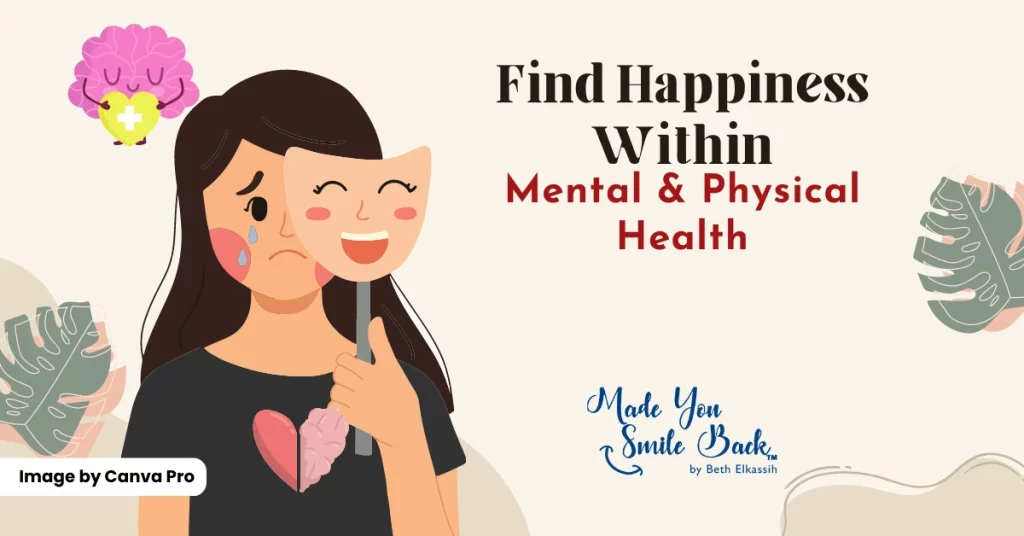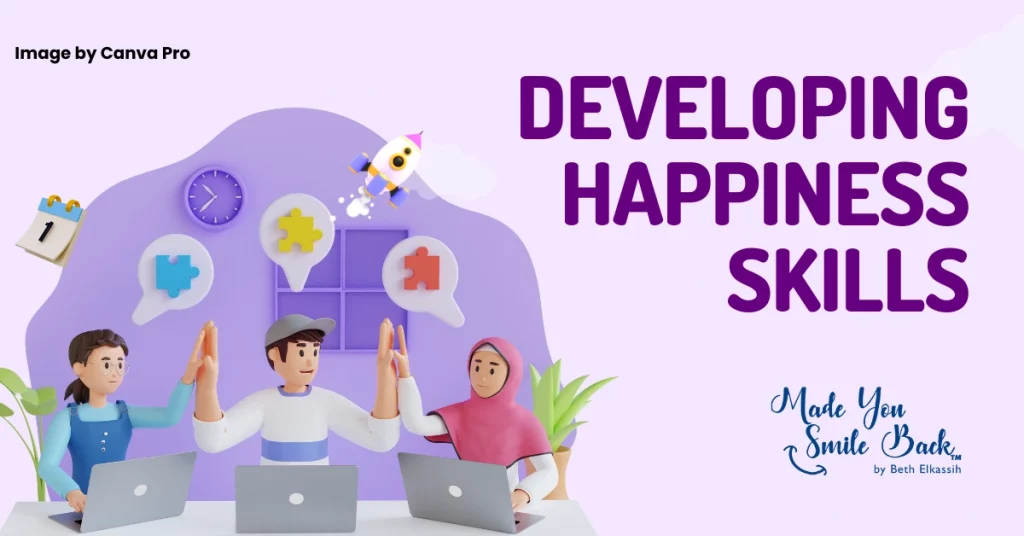How to Find Happiness Within: Practical Tips and Strategies
Are you feeling unfulfilled or unhappy in your life? Do you find yourself constantly searching for happiness outside of yourself, only to come up empty-handed? The truth is, happiness is not something that can be found externally. It is an internal state of being that can only be achieved by finding happiness within yourself.
Finding happiness within can seem like a daunting task, but it is not impossible. It requires a shift in mindset and a willingness to do the work. By focusing on your internal happiness, you can cultivate a sense of fulfillment and contentment that will radiate outward into all areas of your life. In this article, we will explore various strategies and techniques for finding happiness within yourself. From increasing self-awareness to defining your own unique path to happiness, we will provide you with the tools and insights you need to embark on your own journey towards inner happiness.

Understanding What Happiness Looks Like
The Nature of Happiness
Happiness is a complex emotion that encompasses feelings of joy, contentment, and satisfaction. It is often associated with having a sense of meaning and purpose in life, as well as strong relationships and connections with others.
Happiness is not a fixed state, but rather a dynamic and fluid experience that can change over time. It is influenced by a variety of factors, including genetics, upbringing, and life experiences.
External Factors Vs Internal Factors
External factors such as material possessions, wealth, and social status can contribute to feelings of happiness, but they are not the only or even the most important factors. In fact, research has shown that external factors have a relatively small impact on overall happiness levels.
Internal factors such as mindset, perspective, and inner peace are much more important in determining long-term happiness. Cultivating a sense of gratitude, practicing mindfulness, and focusing on personal growth and development can all contribute to greater happiness and well-being.
It’s important to note that happiness is not a one-size-fits-all experience. What makes one person feel happy may not have the same effect on someone else. Therefore, it’s essential to focus on developing a deep understanding of your own values, needs, and desires in order to cultivate lasting happiness and fulfillment.

Healthy Relationships & Happiness Self-Care
Having healthy relationships is one of the keys to finding happiness within yourself. When you surround yourself with people who love and support you, you’ll feel more fulfilled and content in your life.
Family and Friends
Spending time with your family and friends can bring joy and happiness to your life. These relationships can provide a sense of belonging and connection that is essential for your well-being. Make time to connect with your loved ones and strengthen your relationships. Whether it’s a phone call, text message, or in-person visit, staying connected with your family and friends can improve your mood and overall happiness.
Community and Support
Being part of a community or support system can also have a positive impact on your happiness. Joining a club, volunteering for a cause you care about, or attending events in your local community can help you feel more connected and fulfilled. Surrounding yourself with people who share your interests and values can also help you find a sense of purpose and meaning in your life.
It’s important to remember that healthy relationships require effort and communication. Make sure to communicate your needs and boundaries with your loved ones and seek support when you need it. By prioritizing your relationships and building a strong support system, you’ll be on your way to finding happiness within yourself.

Find Happiness Within: Mental & Physical Health
When it comes to finding happiness within yourself, your physical and mental health play a crucial role. Happiness means taking care of your body and mind in order to help you feel better about yourself and improve your overall well-being. In this section, we’ll explore the connection between health and happiness and provide some tips on how to improve both.
Physical Health
Your physical health is closely linked to your happiness. When you feel good physically, you’re more likely to feel good mentally. Here are some ways to improve your physical health:
- Exercise regularly: Regular exercise can help improve your mood, reduce stress, and boost your overall health. Aim for at least 30 minutes of moderate exercise each day.
- Eat a healthy diet: A balanced diet that includes plenty of fruits, vegetables, and whole grains can help you maintain a healthy weight and reduce your risk of chronic diseases.
- Get enough sleep: Sleep is essential for good health and well-being. Aim for 7-8 hours of sleep each night to help you feel rested and refreshed.
- Practice good hygiene: Taking care of your personal hygiene can help prevent illness and improve your overall health.
Mental Health
Your mental health is just as important as your physical health when it comes to finding happiness within yourself. Here are some ways to improve your mental health:
- Practice self-care: Taking time for yourself to do things you enjoy can help reduce stress and improve your mood.
- Stay connected: Maintaining strong relationships with friends and family can help provide a support system and improve your overall well-being.
- Seek help if needed: If you’re struggling with your mental health, don’t be afraid to reach out for help. Talk to a trusted friend or family member, or seek professional help from a therapist or counselor.
By taking care of your physical and mental health, you can improve your overall well-being and increase your chances of finding happiness within yourself.

Emotions and Happiness of Things That Make You Happy
Understanding Your Emotions
One of the keys to finding happiness within yourself is to understand your emotions. Emotions are complex and can be difficult to navigate, but by learning to recognize and understand them, you can better manage them and improve your overall well-being.
Start by paying attention to how you feel throughout the day. Take note of what triggers certain emotions, whether it’s a particular situation or interaction with someone. By identifying these triggers, you can begin to understand the root causes of your emotions and work to address them.
It’s also important to recognize that emotions are not inherently good or bad. All emotions serve a purpose, even if they don’t always feel pleasant. For example, anxiety can be a useful emotion when it alerts you to potential danger, but it can also be overwhelming and debilitating.
Managing Negative Emotions
Negative emotions like anxiety and depression or getting caught up comparing yourself to others can be particularly challenging to manage, but there are strategies you can use to cope with them. One effective technique is to practice mindfulness, which involves focusing on the present moment and observing your thoughts and feelings without judgment.
Another helpful strategy is to challenge negative thoughts and beliefs. When you find yourself thinking negatively, ask yourself if there is evidence to support that thought. Often, negative thoughts are based on assumptions or biases rather than reality.
It’s also important to take care of your physical health, as this can have a significant impact on your emotional well-being. Make sure you’re getting enough sleep, eating a healthy diet, and engaging in regular exercise.
By understanding and managing your emotions, it is possible to find a proactive approach to finding happiness within yourself. Remember that emotions are a natural part of the human experience, and it’s okay to feel a range of emotions, both positive and negative. The key is to learn how to manage them in a healthy and productive way.

Finding Contentment & Imagining the Best
Contentment is a state of mind that allows you to feel satisfied with what you have. It is a feeling of peace and happiness that comes from within, rather than from external sources. Here are some sub-sections to help you find contentment:
Wealth and Possessions
While money and possessions can bring temporary happiness, they are not the key to long-term contentment. In fact, research shows that people who focus on material possessions are less happy than those who focus on experiences and relationships. Instead of accumulating more things, try to focus on experiences that bring you joy, such as spending time with loved ones, traveling, or pursuing a hobby.
Status and Approval
Many people believe that achieving a certain status or receiving approval from others will bring them contentment. However, seeking validation from external sources can be a never-ending cycle. Instead, try to focus on your own values and goals. Set realistic expectations for yourself and work towards achieving them. Celebrate your accomplishments and don’t worry too much about what others think.
Remember, contentment is not something that can be achieved overnight. It requires a shift in mindset and a willingness to let go of external sources of happiness. By focusing on experiences, relationships, and your own values, you can find contentment within yourself.

Developing Happiness Skills
Developing happiness skills is a process that requires patience and practice. It involves cultivating habits and seeking professional help when necessary. Here are two essential ways to develop happiness skills.
Habit Formation
Habits are behaviors that we repeat regularly, often without even realizing it. Developing positive habits can help you find happiness within yourself. Here are some habits you can cultivate to promote happiness:
- Gratitude: Take time each day to reflect on the things you are grateful for. This can be as simple as writing down three things you are thankful for each day.
- Mindfulness: Practice mindfulness by focusing on the present moment without judgment. You can do this through meditation, deep breathing, or simply paying attention to your surroundings.
- Exercise: Exercise has been shown to boost mood and reduce stress. Find an activity you enjoy and make it a regular part of your routine.
- Social Connections: Cultivate positive relationships with friends and family. Make time to connect with others and build a support system.
Seeking Professional Help
Sometimes, developing happiness skills can be challenging, and it may be necessary to seek professional help. A therapist can provide guidance and support as you work to find happiness within yourself. Here are some ways a therapist can help:
- Identifying Negative Thought Patterns: A therapist can help you identify negative thought patterns that may be holding you back from finding happiness.
- Developing Coping Strategies: A therapist can teach you coping strategies to manage stress and difficult emotions.
- Providing Support: A therapist can provide a safe and supportive environment to explore your feelings and work towards finding happiness.
Remember, developing happiness skills is a process, and it takes time and effort. By cultivating positive habits and seeking professional help when necessary, you can find happiness within yourself.

In Conclusion
In conclusion, finding happiness within yourself is a journey that requires patience and effort. It is important to recognize that happiness is not something that can be found externally, but rather it is a state of mind that comes from within. By focusing on your own internal happiness, you can lead a more fulfilling life that is consistent with your values and goals.
One of the key steps to finding happiness within yourself is to increase your self-awareness. This can be achieved through practices such as daily mindfulness, journaling, and psychotherapy. By becoming more aware of your thoughts and emotions, you can better understand what brings you joy and what detracts from it.
Another important aspect of finding happiness within yourself is to cultivate a sense of gratitude. Reflecting on what you are grateful for can help shift your focus away from negative thoughts and towards positive ones. This can be as simple as taking a few minutes each day to write down three things you are grateful for.
It is also important to prioritize self-care and to engage in activities that bring you joy. This can include exercise, spending time with loved ones, pursuing hobbies, and taking time to relax and recharge.
Ultimately, finding happiness within yourself is a personal journey that requires self-reflection and a willingness to make changes. By focusing on your own internal happiness, you can lead a more fulfilling and meaningful life.




